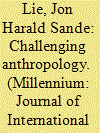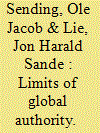| Srl | Item |
| 1 |
ID:
119986


|
|
|
|
|
| Publication |
2013.
|
| Summary/Abstract |
Ethnography and anthropology are intrinsically linked, but recently other disciplines have started to draw inspiration from anthropological methods. The ongoing ethnographic turn in International Relations has spurred debate on what ethnography is, what it means and entails in practice, and how to apply it in International Relations. Some assert that the ethnographic turn could not have taken place without adopting a selective and antiquated notion of ethnography; others counter that this argument draws on a caricatured version of ethnography. This article offers one anthropologist's reflections on these issues, drawing on ethnographic work within an international organisation and a state apparatus - both of which are areas of study more common in International Relations than in anthropology. This is not an International Relations turn of anthropology, but the practical and methodological challenges it involves are relevant to the ethnographic turn of International Relations and the disjuncture between the ethnographic ideals and anthropological practice.
|
|
|
|
|
|
|
|
|
|
|
|
|
|
|
|
| 2 |
ID:
142240


|
|
|
|
|
| Summary/Abstract |
Global benchmarks (re)shape political conversations and institutionalise authoritative languages. It does not necessarily follow, however, that benchmarks can exert a lasting or significant influence over policies and behaviour of benchmarked actors. We analyse how the World Bank uses benchmarks to manage its relations with both donors and recipient governments. We analyse the role of the World Bank’s Country Policy and Institutional Assessment (CPIA), both at headquarters and in relation to the recent history of two countries in Africa: Ethiopia and Malawi. We find that the CPIA is not – and contrary to what one would expect from the CPIA’s nominal function and the literature on benchmarks – a very important tool for signalling incentives and allocating funds, or shaping the policy dialogue or the World Bank’s strategy in these two countries. Rather, the CPIA is used highly selectively as one factor among many in the negotiations between World Bank staff and governments. We conclude that the CPIA helps establish the World Bank as an actor that embodies global authority on development issues, including with donors, but that there is a tension between such global authority on the one hand, and concrete authority to shape policy in domestic contexts, on the other.
|
|
|
|
|
|
|
|
|
|
|
|
|
|
|
|